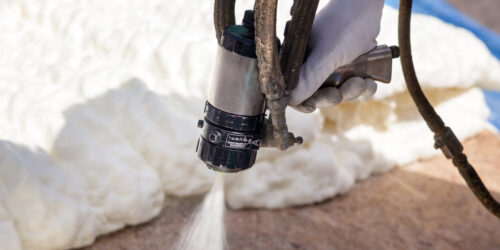Spray Foam Insulation Installers: What to Expect
- Best insulation on the market for home or business
- More than 2xs more efficient than traditional insulation
- Lowers energy bills, protects against environmental noise and cuts carbon emissions
Opting for the best insulation around means you’ll want to install spray foam insulation in your home. Delivering the highest levels of protection against heat loss accompanied by other benefits such as sound-proofing, spray foam insulation is a fantastic investment that’s also environmentally friendly.
As a permanent measure, involving strong chemicals and the very structure of your home, it’s very important spray foam is installed by experienced spray foam installers. Lasting for more than 30 years, spray foam is an enduring solution which must be installed correctly first-time.
With the opportunity to operate your home at optimum levels of energy-efficiency whilst lowering your energy bills and carbon consumption, spray foam insulation is a superb choice with many long-term benefits.
Let’s take a look at what spray foam insulation is, where it can be installed, what installation involves and where you can find good spray foam insulation installers. We’ll explore the following questions for full coverage of the topic.

What's On This Page?
Click the links below and head straight to a specific section of the article.
What Is Spray Foam Insulation?
Spray foam insulation is a type of liquid plastic which expands and becomes hard as it cools. Invented back in 1937 by Otto Bayer, a German chemist, polyurethane is an extremely versatile material with robust qualities which makes it suitable for use in an enormous number of contemporary products.
Heat and weather-resistant, polyurethane is also able to prevent air passing through as well as sound, so it’s perfect for property insulation and a superb energy-saving solution.
Icynene Europe cornered the market back in 1986 and still hold monopoly for spray foam products. Both here in the UK and worldwide, you’ll find Icynene spray foam is the go-to brand across the industry, delivering superb performance and a quality product.
Types
There are two types of spray foam you can choose to install:
- Open cell spray foam
- Closed cell spray foam
Both are made from polyurethane but the main difference between the two is the type of barrier each forms.
Open cell spray foam: Choosing to install open cell spray foam will provide you with spray foam insulation which can block out sound as well as air. However, open cell spray foam is softer and less dense so your spray foam insulation installers will need to apply a thicker coating. More layers means a higher quantity of spray foam is used which will cost you more per unit.
Closed cell spray foam: On the other hand, if your spray foam installation installers recommend closed cell spray foam, you’ll benefit from a more rigid foam which has high efficiency.
However, closed cell spray foam is so dense it prevents moisture as well as air passing through meaning it can cause condensation if you do not have a good ventilation solution in place. You can read more on our guide to open and closed cell spray foam insulation.
Which Is Best for Installation In My Home?
Spray foam insulation installers will advise you on the best type of spray foam insulation to use in your home after carrying out a detailed survey of your property. Always use a trained, BBA-approved spray foam installer from a reputable spray foam insulation company.
For a full comparison of open cell and closed cell spray foam read our analysis: open cell vs closed cell spray foam insulation.
Enter a few details now and you can get a quote from an expert, qualified spray foam installer and see how much you’d pay today.
Where Can Spray Foam Insulation Be Installed?
Spray foam insulation installers can install spray foam insulation in homes, businesses and industrial buildings. It’s robust qualities means spray foam insulation is suitable for almost all types of properties apart from:
- listed buildings
- properties with thatched roofs
Versatile, long-lasting and able to fill any space, spray foam can be installed in the following places in the home:
Roofs
We don’t give much thought to our roofs unless they’re leaking but your roof is the place where the most energy waste can occur. Responsible for the loss of up to 25% of your heating, if left uninsulated, the roof is the most popular place to install spray foam insulation.
However, you need to ensure your roof is in good condition before installation can go ahead. Your spray foam insulation installer will check this for you using a structured survey assessment before any work is carried out.
Lofts
Similarly, lofts, traditionally insulated with lower quality blanket or loose-fill insulation, are now frequently updated with spray foam insulation.
More efficient, better quality and long-lasting, spray foam installed in your loft will save you large amounts of wasted heat which is lost, if insulation is poor, as it rises to the top of your property.
For a full overview of loft insulation, read our complete guide to loft insulation for all you need to know.
Cavity Walls and Floors
Able to expand, spray foam insulation installers can fit spray foam insulation easily into any space, including cavity walls and floors for a comprehensive insulation solution. With the capacity to keep your home warmer in winter and cooler in summer, without any further spend required, spray foam is an excellent investment.
The loft can be the second biggest area of home heat loss, so it's important that you ensure it's insulated properly.
Spray foam is particularly ideal for tricky cavity walls and solid walls where other types of insulation can’t be used. If you choose to install open cell spray foam insulation in cavity walls, you’ll notice your walls have a little more give due to the softer consistency of soft cell foam – making banging your toe on the wall a little less painful!
Spray foam insulation can also be used in offices, schools, car parks, barns, storage containers and more.
What Does Spray Foam Installation Involve?
Spray foam installation is quick and easy when performed by professional spray foam insulation installers.
Can I Install Spray Foam Myself?
Spray foam is not something you can apply yourself. Fumes from chemicals released during the installation process can affect your breathing, eyes and skin whilst incorrect installation could cause damage to the structure of your home whilst compromising the quality of the seal.
Understanding which is the best type of spray foam to install in your home requires professional training. Installing the wrong type of spray foam could lead to condensation or water build-up underneath the insulation causing important structural timbers to rot as well as a range of other serious problems.
Spray foam is a permanent solution located within the structure of your home so it’s crucial it is installed by professional spray foam insulation installers.
Preliminary Survey
Your spray foam insulation installers will carry out a comprehensive survey of your property before commencing the work. The survey covers:
- An assessment of the quality of the existing insulation in your home, calculated using the U-value method
- An evaluation of the potential for condensation or any other issues to develop plus any solutions required to avoid them arising
- The cost and timescale for the work
The preliminary survey is essential because spray foam insulation is a permanent measure so it’s critical the right type and depth of foam is applied under the correct conditions. Before booking with spray foam insulation installers, make sure an initial survey is part of their installation process.
If you agree to the work, you will need to ensure you do not need to return to the space during application and your installers have clear areas to operate in.
Your spray foam installer will apply the foam with a spray gun. The polyurethane foam is created inside the gun as the polymer resins and urethane bonds mix together in the nozzle. Your installer will have pre-set the spray to deliver the foam with the depth required for your property and this will be carefully monitored throughout installation.
Setting rapidly, the foam quickly becomes hard and fixed in place. You should be able to return to the space within two hours of application.
How Much Does Spray Foam Installation Cost?
The cost of your spray foam installation will depend on the size of your home, type of spray foam you have, the thickness of spray foam applied and the location(s) where the foam will be applied.
Typically, you can expect to pay spray foam insulation installers around £3,000. This would be the average cost for a three bedroom semi-detached house.
How does costs compare to traditional insulation? Let’s take a look.
How Do I Find Good Spray Foam Insulation Installers?
The spray foam insulation installers you select should be trained professionals. Your chosen spray foam insulation service should send you spray foam insulation installers who:
- are BBA-approved (British Board of Agrément)
- install and use BBA-approved products
- can produce a valid certificate to prove the spray foam product installed is BBA-approved
- have insurance and can evidence your installation will be under warranty
- follow all Building Regulations, health and safety requirements and manufacturer specifications during installation
Don’t take any chances; enter a few details and find the best spray foam installers near you.
Related articles
View all Insulation articles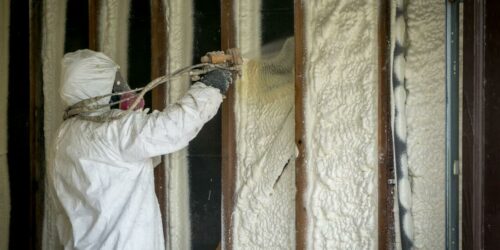
How Long Does Spray Foam Insulation Last?
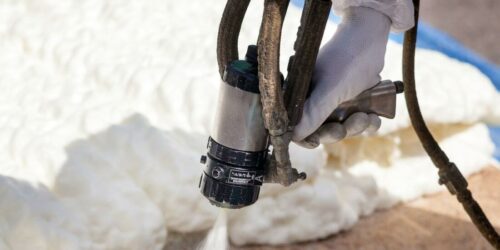
Can I Install DIY Spray Foam Insulation Myself?
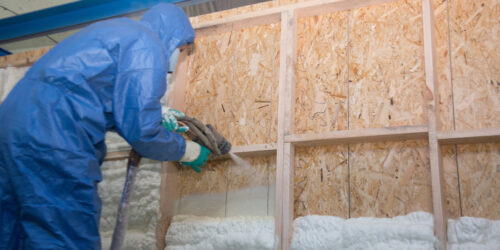
Six Benefits of Spray Foam Insulation
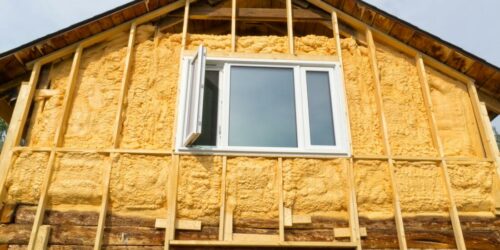
Is My Property Suitable for Spray-On Insulation Foam?
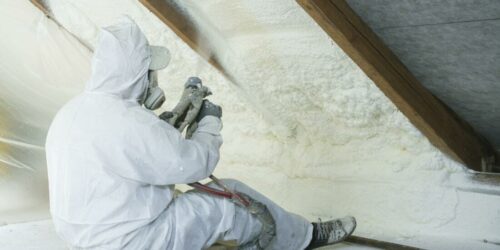
Why Consider Spray Foam Insulation in Roofs?
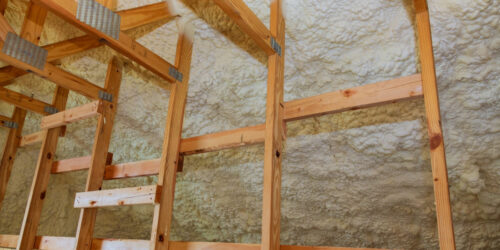
Icynene Spray Foam Insulation: A Complete Guide
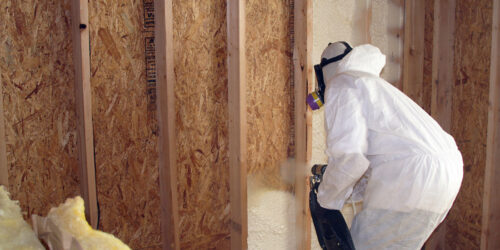
Open Cell vs Closed Cell Spray Foam Insulation: What’s The Difference?
